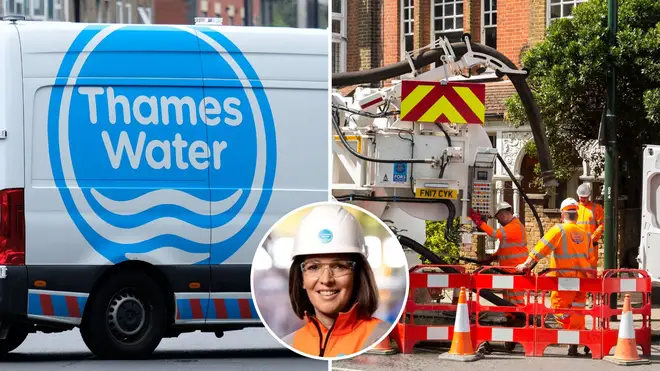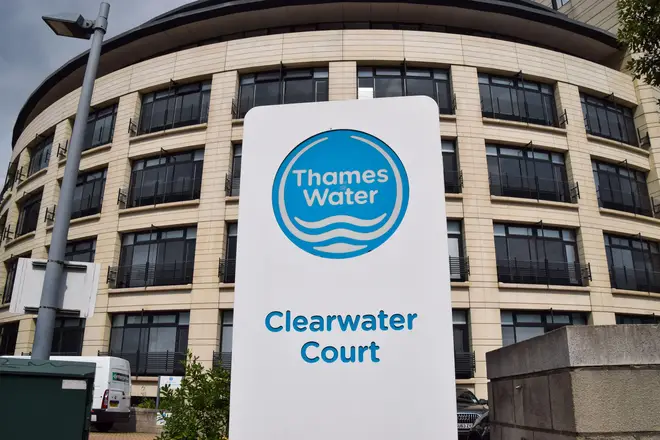
Tonight with Andrew Marr 6pm - 7pm
29 June 2023, 00:46

Ministers fear contingency plans may be needed for other water firms as the government considers renationalising debt-laden Thames Water.
Ministers are discussing the potential of temporarily renationalising Thames Water under a special administration regime (SAR).
It follows reports that the government may also be drawing up contingency plans for other water firms amid fears that they could face similar financial troubles.
Thames Water is responsible for some 15 million customers but is now in talks with water regulator Ofwat over concerns of its potential collapse.
Nationalisation is being considered in the hope it could help secure a refinancing package for the company - but this could result in a rise in bill costs for customers.
It comes after reports that the company could need a potential £10bn more than already budgeted just to make the infrastructural improvements needed to meet regulation standards, according to the Guardian.
They also added this figure does not include the interest payments on its £14bn worth of debt.
A spokesman for Thames Water said the company still holds “a strong liquidity position” but refused to comment on the size of cash needed to remedy its potential collapse.
Returning the company to public hands is just one option being discussed among ministers and regulators, as the water firm could also be sold on.
The government insisted on Wednesday work is going on "behind the scenes" to ensure that customers of debt-laden Thames Water "will not be impacted" following reports that the company is on the verge of going bust.

Business Secretary Kemi Badenoch said she was "very concerned" about the disclosures but that efforts must be made to make sure the company "survives".
She also added, speaking to Sky News, that the government was doing what it could to make sure “Thames Water as an entity” survived.
Environment minister Rebecca Pow moved to reassure Thames Water's 15 million customers that their water supplies will be protected.
She told the Commons: "Overall the water companies are considered resilient, but there is a lot of work going on behind the scenes with Thames Water to ensure that customers will not be impacted.
"And there is a process in place if necessary to move us to the next stage."
She added: "Customers should rest assured that their supplies will be protected, both water and waste water."
It comes as customers face huge hikes in bills next year of over £200 or around forty per cent. Utility firms have said price rises are needed to meet strict pollution targets. It could result in annual bills increasing from an average of about £450 to £680, plus inflation, in parts of the country.
Ministers and Ofwat, the industry regulator are looking into putting Thames Water into a special administration regime that would temporarily put the company into public ownership, according to Sky News.
The discussions are understood to be taking place between water regulator Ofwat, the Department for Environment, Food and Rural Affairs (Defra) and the Treasury, but the plans are at a very early stage and may not need to be put in place.
Ofwat raised concerns about the firm’s finances last year. Last June investors gave £500m in “support for an additional £1bn to follow subject to certain conditions.”

The revelation about public ownership came just hours after Thames Water suddenly announced the departure of chief executive Sarah Bentley.
She warned in December that rising costs were making it harder to tackle the company’s problems.
She was appointed in 2020 and is leaving the board with immediate effect but Thames Water said she would be continuing to support the firm until her replacement is found.
In a statement, Ms Bentley said it had been "an honour to take on such a significant challenge".
Weeks ago she announced she was giving up her bonus amid criticism of the firm’s environmental performance.
Giving up her bonus, she said: “it simply doesn’t feel right to take my bonus this year,” but the move was dismissed as a ‘PR stunt’ by trade unions.
Thames Water has a poor record on leaks and water waste and has been under scrutiny amid the raw sewage scandal.
The company plans to invest £1.6bn in its sewage treatment works over the next two years, and has a target of reducing the total duration of sewage discharges across London and the Thames Valley by 2030.
In a statement in May, Thames Water blamed "extraordinary energy costs" and "two severe weather events”, saying they had affected customer service and environmental performance in 2022-23.
Nearly one litre in every four flowing through Thames water’s mains pipes is lost to leaks and its leakage rate is at a five-year high.
Children's minister Claire Coutinho did not comment directly on reports that the Government has been drawing up contingency plans to prepare for the possible collapse of Thames Water.
Declining to be drawn on the reports, she told Sky News: "I certainly think there are water companies like Thames Water which are in difficult positions, but I think our position as Government is to make sure that we have the right policies in place to see consumers protected but also that we're dealing with things which are really important to the country, like dealing with the sewage leaks.
"So what we've been asking companies to do is to make sure they're putting forward investment plans and then what we've separately been doing is helping households with their family finances through cost-of-living support."
Thames Water is the country's largest water company with around 15 million customers.
Ofwat warned last December over the financial resilience of Thames Water, as well as Yorkshire Water, SES Water and Portsmouth Water.